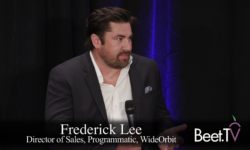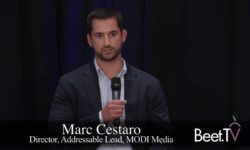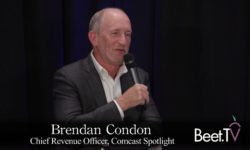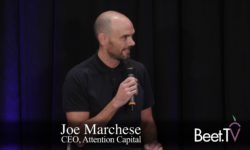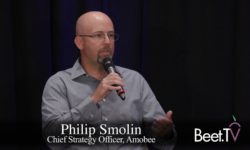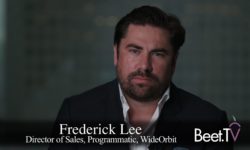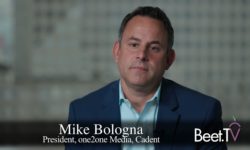Over the last year, TV networks have been bending over themselves to provide the capabilities demanded by the fastest-growing segment of new advertisers – smaller, “direct-to-consumer” brands.
But it turns out those same capabilities may also trickle up to the big brands that were more commonly thought of as TV advertisers.
That is according to one long-time TV ad exec who recently added a three-letter acronym to his role.
NBCUniversal ad sales senior vice president Brian Norris recently took charge of a “D2C” push.
“These brands were born in social, and they get to a point where they need to scale their businesses,” he told EY’s Janet Balis during Beet Retreat in the City, “We’re Going Local!”.
Norris was talking about how advanced TV ad capabilities allow emerging direct-to-consumer brands to get the appeal of TV whilst also enjoying the measurability of digital.
But, asked if those same capabilities can be used by more than just the “emerging” set, he said: “These brands are primarily thinking about how do they succeed against their KPIs. When you’re looking at brands that are new to television and you’re looking at established brands, the one thing that they have in common is that they have to achieve against KPIs.
“Whether that KPI is site conversion (for new brands) or brand lift (for mature brands), they have to achieve against those.
“There’s really no difference in success when you’re thinking about a direct-to-consumer brand and a legacy brand. We ultimately, we need to perform for those brands in order for them to grow and ultimately stay with our platform.”
In January, eMarketer counted more than 400 D2C brands operating in the US. IAB analyzed 250 of them. Commonly described as including Casper, Dollar Shave Club and Chubbies ,they typically got their early lift by leveraging targeting online ads, but many have come to view TV advertising as the next stage in scaling their business.
An umbrella group, the VAB, in a new report, has observed how D2C companies it tracks hiked their TV spending by 60% last year, bringing the total up to $3.8 billion.
All of which places Norris and his peers under greater pressure to prove the effectiveness of TV as a medium.
“I get the question pretty often, ‘Why did you leave direct response?’,” he says. “Part of my answer is around attribution… not really believing (until now) that television was getting the credit that it deserved for attribution.
“I think that it’s really important to give television the credit that it deserves and not just have that value siphoned off by a social platform.”
Comcast, owner of Norris’ NBCUniversal, has developed and acquired its way to offering such a solution, including taking on AdSmart through its acquisition of Sky and its earlier acquisition of video ad-tech software FreeWheel.
This video is part of a series from the Beet Retreat in the City, “We’re Going Local!” hosted by GroupM Worldwide and sponsored by Amobee, Comcast Spotlight, TVSquared and WideOrbit. Please visit this page for additional segments.







